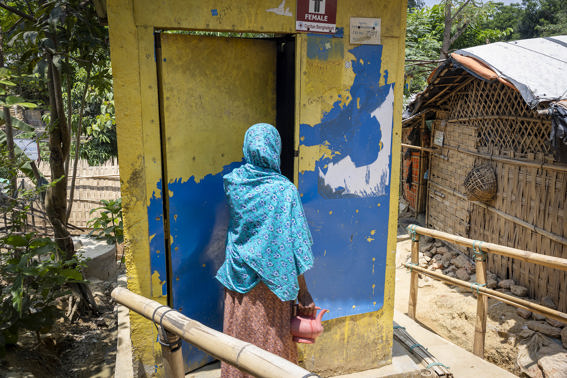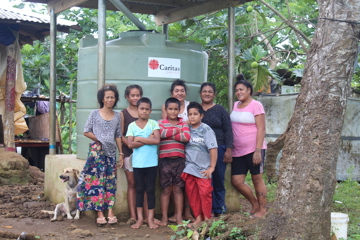Global Issues
WASH Programs
Understanding the Impact of Water, Sanitation, and Hygiene (WASH) on Health

Thandolwayo (9) from Tanzania washes her face from the new water pipe, installed in her village with the support of Caritas Australia. Before the pipe was installed, Thandolwayo and other members of the community had to walk over 5km one way at least once a day down a steep and dangerous hill to collect dirty water from the Gweyi river. She would often get sick and miss school from illness and being tired from collecting water. Photo credit: Richard Wainwright/Caritas Australia.
Access to clean water, proper sanitation, and effective hygiene practices is essential for human dignity and well-being.
Collectively known as WASH (Water, Sanitation, and Hygiene), these basic necessities play a critical role in preventing disease, improving health outcomes, and fostering sustainable development.
However, millions of people globally lack access to WASH facilities, leading to significant health and socio-economic challenges. Caritas Australia is committed to addressing these challenges through community-driven WASH initiatives, helping vulnerable populations break free from cycles of poverty and build resilient, thriving communities.
What is WASH?
WASH refers to the integration of three essential components-water, sanitation, and hygiene-that are fundamental to public health and sustainable development.

Memory collects water at her family village in Mwanza district, southern Malawi. Photo: Caritas Australia
Water
Ensuring reliable access to safe drinking water for daily needs, including cooking, drinking, and personal hygiene.

Sakhina's family can now access latrines near their home in the refugee camp in Cox's Bazar. Photo: Caritas Australia
Sanitation
Providing facilities and systems to safely dispose of human waste, preventing environmental contamination.

Halima showing her children how to use a hand-washing station in her Rohingya refugee camp in Cox’s Bazar, Bangladesh. Photo credit: Inmanuel Biswas/Caritas Bangladesh
Hygiene
Promoting behaviours like handwashing, menstrual hygiene management, and food safety to reduce disease transmission.
How Does Water and Sanitation Affect Health?
The link between water, sanitation, and health is undeniable. Poor WASH conditions contribute to the spread of waterborne diseases, malnutrition, and increased mortality rates, particularly in children under five.
Waterborne Diseases
Contaminated water sources lead to illnesses like cholera, typhoid, and diarrhoea.
Child Mortality
Diarrhoeal diseases alone are responsible for approximately 500,000 deaths annually in children under five.
Malnutrition
Frequent infections from unsafe water weaken immune systems and exacerbate malnutrition.
Global Statistics
2 billion
people lack access to safely managed drinking water.
4.2 billion
people live without safely managed sanitation.
1 in 3
schools lack access to water and basic sanitation
80%
of water-deprived households involve women and girls carrying the burden of water collection
By improving WASH infrastructure and education, these preventable health challenges can be significantly reduced.
Support our WASH programs Donate Now
Donate NowWASH Initiatives - Making a Difference
Caritas Australia works alongside local communities to implement sustainable WASH solutions, tailored to address specific regional challenges. These initiatives empower communities to maintain their water and sanitation systems and adopt life-saving hygiene practices.

Rainwater Harvesting
Through rainwater harvesting initiatives, Caritas Samoa has equipped families with sustainable water solutions. This project has improved access to clean water for drinking and cooking, particularly in remote villages.

Thandolwayo's life changed when she could access clean water in her village. Photo: Richard Wainwright/Caritas Australia
Solar-powered Water System
Thandolwayo’s hope to be a nurse seemed almost impossible to realise, until Caritas Hwange helped the village install a solar-powered water system. It’s bringing new opportunities, new hope – and a chance for Thandolwayo to concentrate on her education and her future.

The support of people like you helped Sakhina access clean water so that she and her family can stay healthy. Photo: Caritas Australia
Sanitation
As a part of WASH, our partner Caritas Bangladesh provides food, shelter, water, sanitation, healthcare and counselling to the displaced people living in the Cox's Bazar refugee camp.
"Since we’ve had the water tank, there’s been a big help for us because when our taps aren’t working, there’s a water tank we can use for the whole day."

WASH and the Sustainable Development Goals (SDGs)
WASH is integral to achieving several United Nations Sustainable Development Goals, particularly:
- Goal 3: Good Health and Well-being.
- Goal 6: Clean Water and Sanitation.
- Goal 13: Climate Action.
Through its WASH initiatives, Caritas supports global efforts to create healthier, more sustainable communities.
Challenges and Opportunities with WASH
Urban vs. Rural Challenges
- Urban Areas: Overcrowding and inadequate infrastructure often lead to poor waste management and water contamination.
- Rural Areas: Geographic isolation makes it difficult to establish and maintain water and sanitation systems.
Opportunities for Change
- Innovative Technologies: Solar-powered water pumps and low-cost filtration systems offer scalable solutions.
- Community Engagement: Empowering communities to take ownership of WASH projects ensures long-term sustainability.
Support our WASH programs Donate Now
Donate NowHow You Can Support Our Mission
Donate Today
Your contributions can:
- Build safe water systems.
- Provide hygiene education to children and families.
- Construct sanitation facilities in under-resourced areas.
Become a Champion for Change
By signing up to become a Champion for Change, your monthly gifts can help transform lives today, tomorrow and every day.
$18 a month could buy water filters to provide families and students in Malawi with access to clean and safe water.
Give a Global Gift
Celebrate special days with a gift that gives back.
Each card makes a difference by supporting transformative global programs.
FAQs About WASH
WASH stands for Water, Sanitation, and Hygiene. It is vital for preventing diseases, improving quality of life, and fostering sustainable development in communities worldwide.
Proper sanitation prevents the contamination of water sources, reducing the spread of waterborne diseases like cholera, typhoid, and dysentery.
WASH helps prevent diarrhoeal diseases, respiratory infections, and parasitic infections, which are common in areas with poor sanitation and hygiene.
Hygiene practices like handwashing with soap reduce the risk of infections and improve
Improving WASH services supports SDGs related to health (Goal 3), clean water and sanitation (Goal 6), and education (Goal 4).
Caritas implements community-led WASH projects, including constructing water systems, improving sanitation facilities, and conducting hygiene education programs.
Many developing nations in regions like Sub-Saharan Africa and South Asia struggle with inadequate access to clean water and sanitation.
By protecting natural water supplies, regularly maintaining infrastructure, and promoting community ownership of WASH projects.
Access to WASH reduces gender inequality, as women and girls spend less time fetching water, and it improves school attendance, especially for girls.
You can donate to fund life-changing projects, volunteer your time to support initiatives, or advocate for the importance of WASH in global development.












